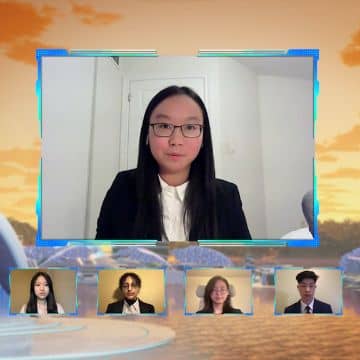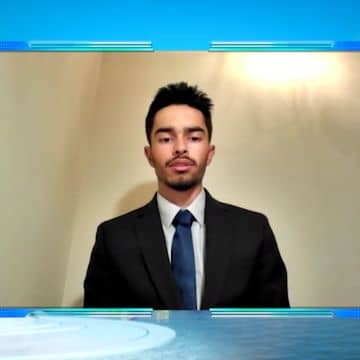Mentoring the water leaders of the future in the Xylem Innovation Challenge
As a project manager at Xylem, Leo Huang works with some of the most innovative technologies in the water sector – including free-swimming tools that inspect water pipelines for damage and breaks. During the past year, however, Huang’s passion for the environment drove him to do even more. He is one of 60 Xylem employees who volunteered their time to mentor students in a global competition to find solutions to key water challenges.
The Xylem Global Student Innovation Challenge brought together over 800 students, between 13 and 25 years of age, from 52 countries. They had eight weeks to come up with game-changing solutions to four critical challenges related to water, from helping communities get to Net Zero to designing water-secure cities of the future. A number of Xylem partners and industry leaders participated and helped facilitate the event, including Esri, GWI, Oceanix, Americares, Emmaboda Energi and Greater Western Water. Competition judges included leaders from Xylem, Esri and Thames Water.
As the project lead for the initiative, Huang helped organize the event from start to finish. “It’s been a really amazing and rewarding experience,” Huang says.
“What really drives me is the impact Xylem is making with its youth programs. When we have one-on-one sessions with students, they have such positive feedback, and they are grateful for our support in helping them become future leaders in the water sector.”
From critical water hand pumps to floating cities of the future
The Innovation Challenge asked students, participating in either a high school or university track, to solve one of four challenge statements. The first asked them to analyze water or sanitation services in their community, then come up with strategies and content to fuel awareness and engagement around how water can be managed more equitably in the community. The second challenge statement, which Huang says was the most popular, was to come up with a master plan for a floating city for 10,000 people.
“We were really impressed by some of the submissions we received,” Huang says. “In one of the projects in the high school track, the team generated 3D modelling of a floating city, where they implemented machine learning and algorithms to predict some of the data. It was eye-opening for me. We see so much potential in our young generation, and we’re happy to help them out at an early stage.”
The third challenge statement asked students to improve hand pumps in rural Africa, which millions of people rely on as their main source of water. For the fourth challenge, students had to come up with a plan for a community’s water and sewer system to achieve net-zero carbon emissions over the next 30 years.
Opening up water innovation to everyone
“Our goal when creating the challenges was to make them open to students from different backgrounds, age groups and demographics,” Huang says. “We wanted to craft challenges that anyone would be able to tackle, appealing to STEM students as well as to students interested in other areas, such as art or the environment.”
Huang says that what is special about the Innovation Challenges is the mentorship opportunities. During the eight-week challenge, students are paired with Xylem volunteer mentors who offer guidance and advice, helping them with any questions they have. Through the Innovation Challenge’s website, they could schedule one-on-one sessions with mentors, and even contact them after the competition was over.
“From my personal experience as a mentor, I really want to deliver the message to the students that it’s not about money, it’s about the impact we are making on people,” Huang says. “It’s about the small changes that you can do in your community, and when those small changes are added together, we can make big changes in the water sector and the world.”
 The Innovation Challenge awards 12 winning projects from a prize pool of $20,000. This year’s two grand prize winners for the high school and university tracks were both within the category of keeping water flowing in rural communities. The winning high school student developed a process for simplifying pump repairs, ensuring spare parts are in stock, and instructing people how to troubleshoot pumps.
The Innovation Challenge awards 12 winning projects from a prize pool of $20,000. This year’s two grand prize winners for the high school and university tracks were both within the category of keeping water flowing in rural communities. The winning high school student developed a process for simplifying pump repairs, ensuring spare parts are in stock, and instructing people how to troubleshoot pumps.
“It was a very rewarding experience innovating together as a team,” Judy Wu, Team Aquaflow

The winning university team developed an app and voice-messaging service that enables people to report and stay informed about which pumps are working in their community, even if they don’t have a smartphone.
“Solving these water-related issues really inspires me because I that think there really isn’t a more pressing issue,” Surya Tallavarjula, Team Swift
“Since I joined Xylem four years ago, I’m always trying to learn more and make an impact,” Huang says. “I’m proud to work at a company like Xylem that is not only as a global leader in water technology, but also really cares about the environment and investing in our youth. With programs like the Innovation Challenge, we can bring our expertise back to the community and generate interest in water issues at an early age.”
Learn more about Xylem’s youth programs and get involved
Xylem’s Global Student Innovation Challenge is part of Xylem Ignite, a global youth program to build a strong network of passionate student leaders and empower them to drive real changes in the water industry. Winning participants are also invited to Xylem’s Innovator Incubator Program, which helps students take their projects further with Xylem mentorship.


